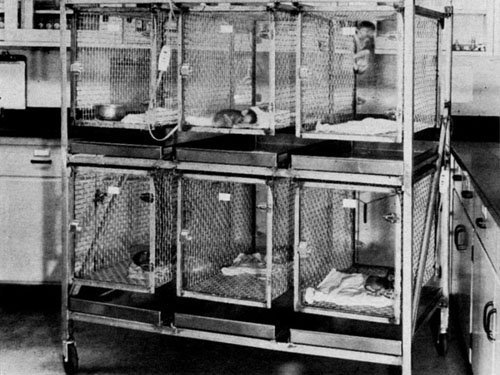This is an experiment designed by American psychologist Harry Harlow in the 1970s to explore the link between social isolation and mental illness in monkeys using a vertical chamber for up to a year after they were born.

He would put monkeys from three months old and three years old in the chambers after they had previously bonded with their mothers for a few weeks. He wanted to break that bond using isolation, and with that produce animal medical depression.
He would isolate them using these chambers, and when the time was right he would introduce them to other monkeys just so see how they would behave/interact after being isolated for a long time.
When the monkeys were released, they didn't show any kind of will for social interactions, they didn't explore much of their environment, some of them avoided others entirely, and a few got really aggressive.
Also, female monkeys didn't show any interest in reproduction, but if they were somehow impregnated anyway, they didn't care for their babies.
Clearly, this experiment caused depression and trauma.
This kind of research wouldn't be considered ethical today.
Even though psychologists could understand the bond between children and a child's mental health, the way of doing this
عندما حررت القردة، فإنها لم تظهر أي نوع من الإرادة للتفاعلات الاجتماعية، فإنها لم تستكشف بيئتها، والبعض منهم تجنب الآخرين تماما، وعدد قليل أظهر عدوانية .
أيضا، لم تظهر القرود الإناث أي اهتمام في التكاثر، ولكن اذا تم تخصيبها بطريقة ما، فإنها لا تظهر أي اهتمام بأطفالها.
ومن الواضح أن هذه التجربة تسبب بالاكتئاب والصدمة.
هذا النوع من البحوث لا يعتبر أخلاقيا اليوم.
على الرغم من أن علماء النفس يمكنهم فهم العلاقة بين الأطفال وصحة الطفل النفسية، بهته الطريقة.
[image] (https://www.onlinepsychologydegree.info/unethical-experiements-psychology/)
that's good to know (Y)
لا أحب العزلة لأن الإنسان إجتماعي بطبعه
العلم و الطب قد يمرون بتجارب و اختبارات قد تكون مؤذية او لا أخلاقية أحيانا لكن الهدف هو فهم بعض العلاقات و النظريات